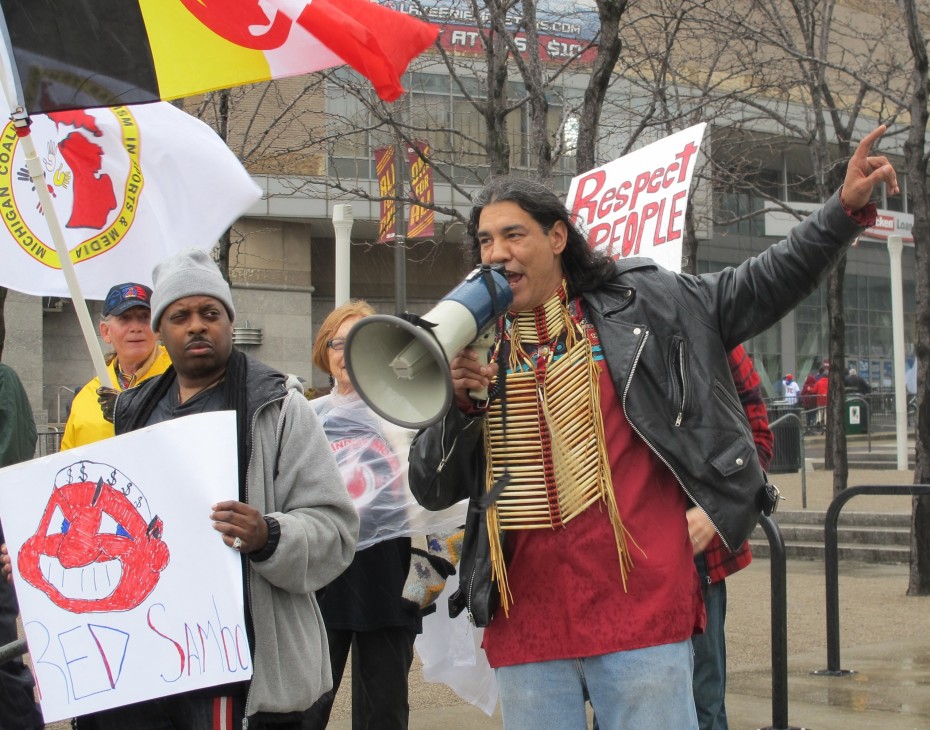
Imagine the outrage if a sports team, college or professional, decided to have a mascot that lampooned African Americans or Latinos. Or Catholics or Jews. Or the disabled.
It just wouldn’t happen. Some things aren’t funny or clever in any form, violating the bounds of respect and decency by their very nature.
Yet when the Cleveland Indians take the field for the ALCS on Friday night, they’ll do so with Chief Wahoo on their sleeves and, most likely, their hats. With his red face, toothy grin and feather, the logo reduces the entire Native American race to a caricature, something less than human.
“It’s denigrating, whether they intend it or not. It’s objectifying us,” Aaron Payment, chairman of the Sault Ste Marie tribe of Chippewa Indians and an executive officer of the National Congress of American Indians, said Thursday.
“We’re the only race that is subjected to this.”
And it’s time — long past time, actually — that it stops. Chief Wahoo, the racist nickname of Washington’s NFL team, the ignorant cheer by Atlanta Braves fans — they’re all offensive, relics of our past that should be sources of embarrassment rather than pride.
Those who defend these stereotypical nicknames, mascots and logos, often vehemently, insist they’re honoring Native Americans, that no one is being hurt by them.
But that’s not our determination to make.
Native Americans have said repeatedly that they find logos like Chief Wahoo or nicknames like the Redskins offensive and demeaning. They’ve even gone to court to stop their use. For fans to then say, “Oh, they’re not that bad,” or “Our fans have a deep attachment to the (fill in the blank)” is the height of arrogance.
Yes, there are some Native Americans who have said they don’t have a problem with the logos or the nicknames. But as long as there are even a few who do, who find them hurtful and demeaning, the topic should not be up for discussion.
“It makes being Native that much more difficult,” said Jacqueline Keeler, a founding member of an activist group called Eradicating Offensive Native Mascotry.
“Most Americans are not aware tribes are not just social clubs, they’re actual sovereign states,” said Keeler, whose parents moved to Cleveland as part of the “Termination Policy,” the federal government’s efforts in the 1950s to shut down reservations.
“Most Americans are completely clueless (about Native American history), and mascots don’t help.”
In fact, they can be quite damaging. The American Psychological Association called for an end to Indian mascots back in 2005, saying they damaged the self-esteem of Native American children and taught non-Indian children that it was OK to participate in and perpetuate culturally abusive behavior.
And it goes beyond that. A social psychologist at the University at Buffalo found last year that Native American mascots were damaging to all ethnic groups.
“Studies with mostly white samples have found that people exposed to American Indian mascots are more likely to negatively stereotype other ethnic groups as well,” said Wendy Quinton, the Buffalo researcher.
Translation: If something is hurtful to one group, it’s hurtful to all. So why are we still so hellbent on defending things that do that?
The Indians at least acknowledge Chief Wahoo can be considered offensive, officially bumping it down to “secondary logo” status this season after reducing its use the last few years. But the team said in a statement it has “no plans of making a change” at this time, and the logo is still featured prominently on its uniform and, of course, its merchandise.
Of the 70-plus items for sale on the Indians website, almost half feature the Wahoo logo. (They at least had the good sense not to put it on the “Respect” T-shirts.)
“As long as the Cleveland Indians can continue to make money off that Wahoo, they’re going to continue,” said Zack Reed, a Cleveland councilman who has lobbied against the logo. “Until they start getting hit — hard — in that wallet, they’re not going to abolish it completely.
“They’re phasing it out,” Reed added. “But that’s like telling me you’re phasing out slavery. If it’s bad, it’s bad.”
Teams and fans can try and justify the use of Native American logos and nicknames all they want. But there’s never an excuse to denigrate or demean a group of people, and doing it for profit or entertainment only makes it worse.
By Nancy Armour
This article was republished with permission from the original author and 2015 Ronald Reagan Media Award recipient, Nancy Armour, and the original publisher, USA Today. Follow columnist Nancy Armour on Twitter @nrarmour.